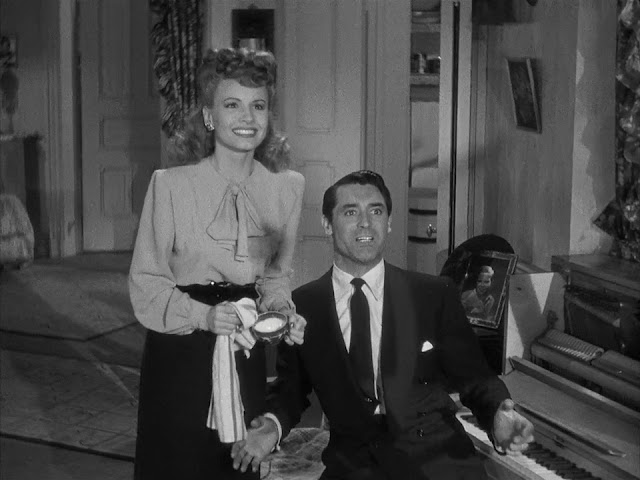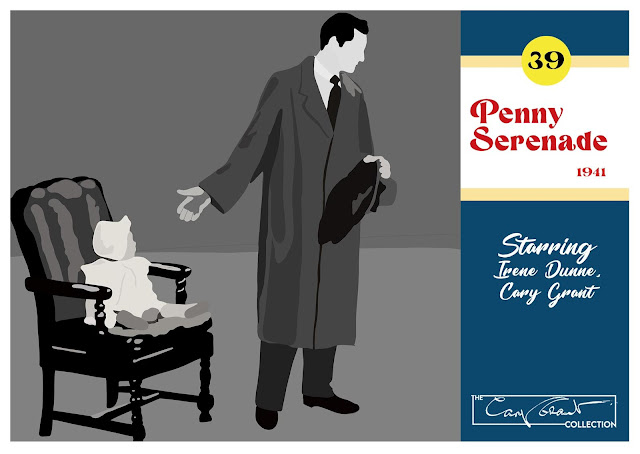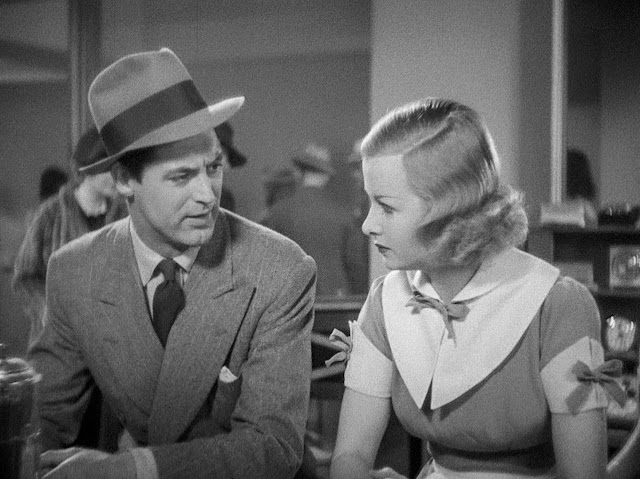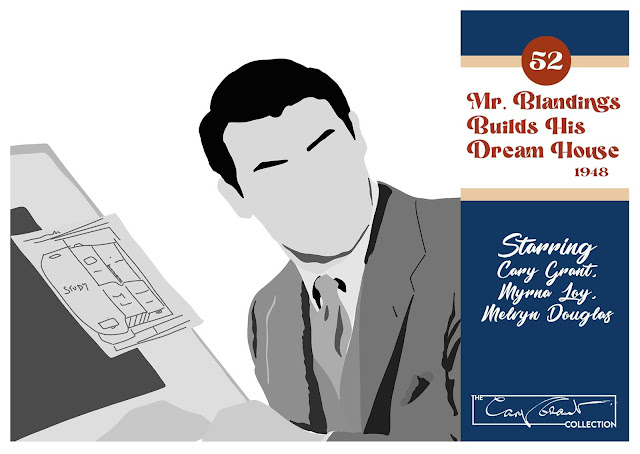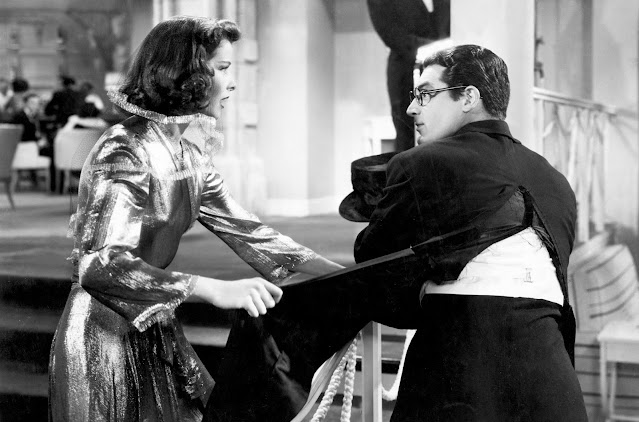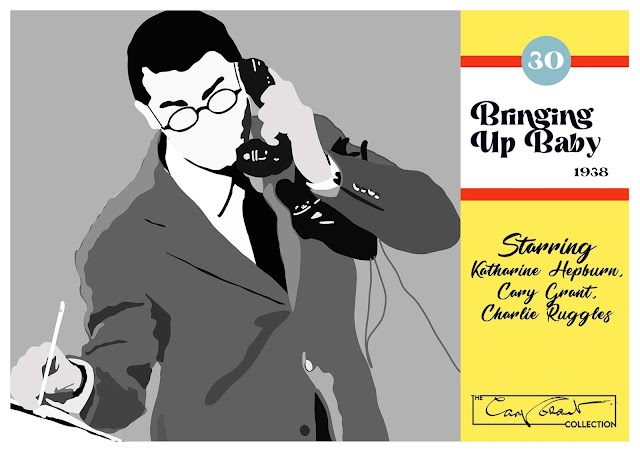Hollywood at home: Cary Grant’s house in Santa Monica
If a man’s castle is his life — past, present and future — you will find a famous life revealed on these pages!
By Joseph Henry Steele
“The happy marrid man dies in good stile at home, surrounded by his weeping wife and children. The old batchelor don’t die at all — he sort of rots away, like a pollywog’s tail.” – Artemus Ward in “The Draft in Baldinsville.”
Cary Grant can’t stand being shut in
Claustrophobia has driven Cary Grant to the sea.
Not into it or out on it, but to its sud-laced fringe. He has finally found what he’d always wanted — an unbounded front yard that would solace the wish to escape which forms the very core of his character.
Cary, one of the few surviving (and I do mean surviving) members of an imaginary Hollywood bachelor club, cannot stand being shut in. So he recently bought a two-storied, twelve-roomed stucco house on the exclusive beach at Santa Monica.
 |
| Bottom photo: Happy hermitage, with the seaward outlook so indispensable to Cary — interrupted only by an expanse of sand and passing bathers. |
He got as close to the sea as possible; the only interruption to his horizon is an occasional distant ship which, instead of obstructing, seems rather to pause in the middle of a framing window the better to create a picture.
Cary says: “I like the ocean because no one can build a house in front of me or plant a high hedge or put up a billboard. Although I must qualify that last — all summer long, on Saturdays and Sundays, a big greasy motorboat keeps chugging up and down with a huge banner on it and a loud-speaker rasping out the virtues of a two-bit dance hall in Venice. But I guess you can’t have everything.”
Cary bought his house from Norma Talmadge. It was the house which formed the southern boundary of Hollywood’s beach society in the nostalgic talkless era. It was bounded on the north by the hotel des artistes known as Marion Davies.
When I walked through the house, I noted that Norma’s touches were still in evidence, decidedly feminine touches destined eventually to be obliterated by the masculine bachelorhood of its present owner.
There were three spare bedrooms, now called guest rooms, done in a variety of French periods; luxurious and gay and unmussable; gold and blue and royal red.
But this is supposed to be about Cary Grant. So, let’s at him.
 |
| Center of activity in this one-man home is the bar-living room — Cary uses the real living room mainly just for piano playing |
About Cary Grant’s home in 1940
When at home, Cary does his living not in the living room, but in what he chooses to call the bar, which is more living room than bar. It is two thirds the width of the house, faced solidly with windows looking out over the pool, the beach and, still beyond, the ocean.
At one end is the bar proper, a small, half-circle affair, while the rest of the room is taken up with down-cushioned chairs from which rising becomes a problem.
Radio and victrola, old English prints, a long coffee table (made according to specifications so that when unfolded it reveals backgammon layouts) magazine racks, a ship’s model, a floor paved with irregular slate — these conspire to make a room to live in no matter what the mood.
The living room itself, so formal in its French gilt and burgundy, is rarely used. It is a room in which dinner jackets and low-bosomed gowns should be worn; where a sleek hostess should preside. (Cary ventured a try at the hostess idea several years ago when he married Virginia Cherrill, but it didn’t take. Maybe it was claustrophobia. I don’t know. And Cary won’t speak of it.)
Four features stand out in the living room; a grand piano, an oil painting of a horse by Ben Marshall, famous English painter, which hangs over the mantelpiece, a round table which again unfolds into a backgammon layout, and two great six-foot mirrors in heavy gilt frames fixed against the wall on either side of the fireplace. The carpet is the color of burgundy.
 |
| Indoors, you will probably find the host at backgammon — his opponent, in this case, being [article] author Steele himself. |
That grand piano standing by a window overlooking the sea is a favorite retreat of Cary’s. The only musical instrument he can play, it is a hangover from his comic-opera days.
Aside from backgammon, which amounts almost to a mania, Cary likes best to sit at the piano and finger familiar tunes. When he tires of that he’ll start improvising jazz melodies of his own.
Cary sings, too, in a highly agreeable baritone. I’ve often pondered the irony of the motion- picture business which does not avail itself of such versatility.
Cary Grant was born in Bristol, England, thirty-six years ago, and he’s been in the United States for nineteen years. He is thoroughly English for many generations back, and if you’ve wondered about his black hair and dark coloring lay it to a Spanish lady who married an early Grant in the days when Philip of Spain was pounding at England’s doors.
 |
| Vintage actor Cary Grant on the beach 1940s |
The house manager, Frank Horn
Cary’s household is managed by his secretary, Frank Horn, the result of a promise made many years ago when Cary’s days were spent in hotels and his future was dubious.
In 1932, when Cary was a leading man with the St. Louis Municipal Opera Company, he first met Horn, a fellow actor. They became instant friends and when they daydreamed in the confines of a hotel room Cary would say, “Someday, Frank, I’m going to Hollywood. And if I click, I’ll have you with me.”
That day came. He remembered his promise and sent for Frank Horn, who has been with him ever since.
Horn supervises the duties of the married couple who serve as butler-cook-and-maid and a chauffeur who navigates the Buick limousine. The garden being mostly sand there is no gardener.
Horn himself drives a Ford convertible which is used for shopping and sundry household errands. He is allowed four cents a mile for the use of the car and recompensed weekly on presentation of an expense account.
 |
| Cary Grant Philadelphia Story movie 1940 |
A self-conscious star
The limousine is the only car Cary owns, and his eventual acquisition of it is an interesting sidelight on his character. Cary has ever dreaded the appellation, “going Hollywood.”
He liked big cars (who doesn’t?) and long dreamed of owning one. As soon as he could afford, it he bought one — a sporty Cord that would turn a Hollywood blonde’s hair back to its natural color.
And then he was utterly miserable. Suddenly he developed a flagellating self-consciousness. He could swear that everybody was staring at him and whispering, “There comes that movie actor.”
Then came stardom and its attendant activities. He found he was too busy to drive himself, and frequently had to study his script en route to the studio. It was simply impossible to drive and study at the same time.
He conquered the complex and got himself a chauffeur and limousine. It is worth recording here, too, something unique about Cary — he has no station wagon.
Secretary Horn presents the monthly bills to his boss, to which are attached corresponding bills for the previous month. This is Cary’s idea, enabling him to keep a close check on expenditures so that none may get out of hand. He questions each item carefully and signs his own checks. There is no specified budget.
Cary’s quirks and companions
Below stairs, the servants refer to Cary in affectionate broad English as The Mawster, while Cary himself has never acquired the habit of nicknaming his employees.
Their affection for him, however, has its momentary setbacks. Meals, for instance, are forever movable; that is to say, although he orders dinner for seven he may not show up until nine or even ten.
Cary is marked by meticulous adherence to little things. As he goes through the house, he is forever automatically emptying ash trays, rearranging magazines, moving objects two or three inches to where he thinks they should be, ad infinitum.
He is hypersensitive, and easily fazed by any criticism of an article he possesses, be it of ever so slight importance.
And being a homeowner for the first time in his life, he can’t quite understand why it might need repairs, since he bought it so recently. Cary has no inclination for grocery shopping, always ending in confusion and buying things he’ll never eat. But he has a weakness for haberdasheries, in which he can spend hours.
When he raids the refrigerator, it is usually for Camembert or Roquefort with crackers and milk. He is a dismal failure at fixing anything for himself and even has trouble preparing dinner for Archibald and Cholmondeley, his two Sealyhams.
He doesn’t mind eating alone so long as the radio or a newspaper is near. When entertaining, he is a retiring host and behaves more like one of the guests. He has never been seen to carve.
His circle of friends includes Randolph Scott, Countess di Frasso, Robert Coote, Jack and Ann Warner, and Reginald Gardiner. He’ll go into a tap dance at the drop of hat.
Like no other bedroom
Aside from the bar, the only other room to achieve a measure of completion is Cary’s bedroom on the second floor. It is a complete expression of his tastes and attitudes. It belongs to no period or school of thought, unlike any bedroom I have ever seen.
Outside the windows, the ocean stretches beyond the horizon. The rich color scheme is chocolate brown and beige; there are a seven-by-eight- foot bed with convenient bookshelves holding radio, cigarettes, etc., at his head and a large, practical fireplace.
The walls, the ceiling and the carpet are in severe chocolate brown, relieved by trimmings in beige.
Over the fireplace hangs an oil painting that has puzzled many a guest. No one has ever been sure whether it was a modernist masterpiece or a lunatic’s self-portrait. But now it can be told — Cary bought it on the banks of the River Seine for ninety-three cents.
At the far end of this chocolate chamber is the private haberdashery — suits, dozens of shirts, a regiment of shoes, a horde of hats and kerchiefs, socks, neckties, suspenders and underwear.
The studied carelessness of Cary’s screen appearance, which contributes so much to his jaunty appeal, is achieved largely by his shirts. These are made to order in New York and have a collar designed by Cary to minimize what he thinks is an oversized neck. There is little basis for his delusion, but no one’s been able to dissuade him.
He wears a forty-two coat, eleven-and-a-half shoes, silk undershirts in solid pastel shades, slippers of a moccasin type made in Sweden. He never wears a smoking jacket, and can’t stand flowers in the bedroom.
Although he is not given to hobbies or collecting objects of art, he has a mania for keeping useless papers and periodicals for years, believing that someday they’ll come in handy.
He is meticulously tidy, never carries anything that will bulge his pockets, and has a collection of pipes that he never uses. He likes cigarettes, but can’t stand them before breakfast.
Due to a slight astigmatism, he always carries corrective glasses. He is an incurably bad correspondent; letters are inevitably shelved, pigeonholed and postponed, finally being answered by an elaborate and apologetic wire.
His library of records contains complete albums of Gershwin, English comic songs, and musical comedy things that he was in.
His attitude towards physical exercise has changed very little in ten years. The punching bag and rowing machine in a hidden little courtyard get a visit from him only at some friend’s mention of middle age or a crack about his waistline. He rides horseback only as called for in his work, never goes in for sailing, trapshooting, tennis or golf.
Cary’s philosophic attitudes
Cary’s philosophic attitudes may best be exemplified by this incident: Almost two years ago there were four of us dining at the Hollywood Brown Derby — Cary, Dick Barthelmess, John Carroll and I. It was early in March, and income tax was making its annual foray into complacent movie pocketbooks.
Cary was having his say: “Cripers! That’s a terrific slice out of a man’s income. A man works hard for years, lives in cheap hotels, packs his worldly goods in a trunk, looks for a job between the shows that flopped — then one day he gets a break. Then what happens? The government comes along and. . .”
Cary interrupted himself. “Oh, well!” he said. “What am I kicking about? Not so many years ago, I was wandering around New York, without a job, and had only one dream — that someday I might get set with an income of a hundred and twenty-five dollars a week. That was my idea of heaven. And here I am, kicking like everybody else in the big money.”
He speared a sizable piece of steak and holding it aloft as if it were a symbol of his point, said: “Let ’em take all they want. Whatever it is, it’s darned cheap for the privilege of living here.”
Cary Grant likes life and has a keen desire to face it honestly. He’s getting a great kick out of his homeownership, and someday he would like to have children. But children must have a mother, and mothers should be wives — I’m sure Cary will not long remain a polliwog’s tail.
Article from clickamericana.com (vintage and retro memories).






